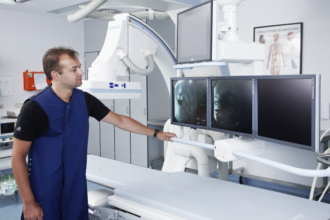Who said you can’t teach an old dog new tricks?
Japanese scientists have trained an 8-year-old Labrador retriever to detect colon cancer by sniffing samples of breath and stool from people. According to their findings in the journal Gut, the dog nailed the diagnosis 95% of the time on the breath test and 98% of the time on the stool test, a performance that compares favorably with colonoscopy, the expensive, distasteful state-of-the art for such matters.
The Black Lab was trained at the St. Sugar Cancer Sniffing Dog Training Center in Chiba, Japan. After training was complete, a team led by Hideto Sonada presented the dog a series of 5 sample stations, one of which contained a specimen from a patient with colon cancer. The other 4 came either from volunteers with no history of cancer or patients with a past history of cancer.
Amazingly, the dog correctly identified the cancerous sample in 37 out of 38 stool tests, and in 33 out of 36 breath tests. It seemed to perform better in samples derived from patients that had early stage disease. The dog’s talents were unaffected by colonic polyps, inflammatory disease, cigarette smoking, or the presence of blood in the stool.
This performance is light-years better than widely-available colon cancer-screening procedures. For example, the fecal occult blood test picks-up early-stage cancer only about 10% of the time.
The results in this case were consistent with previous studies in which dogs could detect cancers of the bladder, breast and ovary, as well as melanomas. This dog’s particular skill at detecting early-stage cancer was unique, however.
Dogs have a highly developed sense of smell, allowing them to detect chemicals that have been diluted to concentrations in the few parts per trillion range. That’s why we use them to sniff-out bombs and drugs at airports, for example.
Alas, Sonada’s group hastened to add that despite their dog’s remarkable success, trained dogs will probably never be used on a large scale to detect cancers in people. It simply takes too long, and it’s too expensive to train them. But the scientists said their findings support the hypothesis that substances specific to each cancer are present in the body of affected individuals, and that it therefore might be possible to develop cost-effective tools to detect them.







